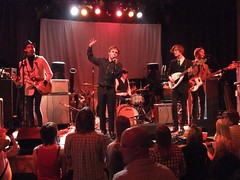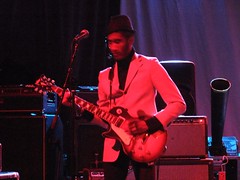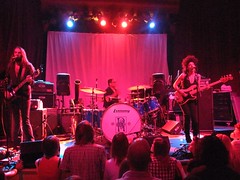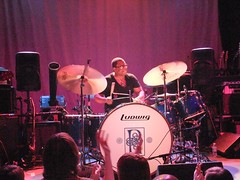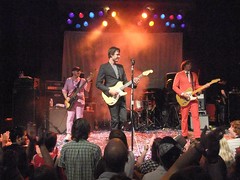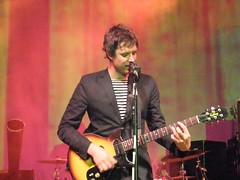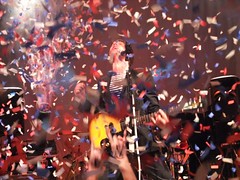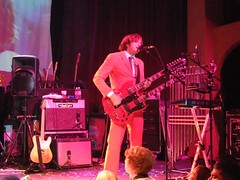My first day at South by Southwest (SXSW), I had a chance to sit down
with
Team Spirit to talk about their eponymous EP, leader Ayad Al
Adhamy’s experience playing with Passion Pit and how they approach their
thrash pop sound. Prior to meeting the band, I had
reviewed Team Spirit,
which comes up in this discussion. Aside from Al Adhamy, we were joined
by guitarist Cosmo Kilburn DiGiulio, bass player Roman Tobias (Toby)
Pettigrew, and drummer Mike Addesso.
Ayad, I actually saw you with Passion Pit in back in 2010, opening for Muse.
Ayad Al Adhamy: In Colorado?
In Denver.
AA: God. That was awesome, playing in arenas.
Yeah, it was a huge venue. Passion Pit was completely different from Muse stylistically.
AA: Definitely
But it connected. You guys worked the crowd and a big part of
that was your doing. On keyboards, you set up a lot of call and
response that got the crowd involved.
AA: Lead keyboard playing. It’s kind of why I decided to go into lead guitar playing
How have you applied some of that to current band?
AA: I think that it actually worked in reverse. I’ve always been more
of a guitar player and played in death metal bands with Toby,
especially when we were in college. We’d call out, “E harmonic minor, I
start on the first, you start on the third!” [makes guitar shred
sounds, laughter]
Toby Pettigrew: There’s smoke coming off the fretboard.
Cosmo DiGiulio: “You start on the third. Go!”
TP: Satan was just hanging out in the corner, smoking a cigarette saying, “Nice one, guys.” [
laughter]
AA: So really, starting off with Passion Pit was like me saying I’ve
got to stop playing guitar for a second. I was studying music synthesis.
I was doing circuit bending and keyboard stuff. “I’m going to play
keyboards.” And I’m a terrible keyboard player, but I can play the leads
like a lead guitarist. And that’s what worked out with Passion Pit and I
did that for the time. Then came the moment when we finished touring
for ages, sat down and thought, “I gotta play guitar!” That time was
great. How could there be any regrets for that? I got to play arenas,
but I’ve got to play guitar. I’m not a keyboard player.
So, the band was about to release…
AA: The second record,
Gossamer. Right at that moment, everyone was like, “We’re all on different paths.” It was a beautiful split.
The right time.
AA: We had some drinks and it was the perfect time for all of us.
Musically and mood-wise, what you’re doing with Team Spirit has a totally different feel.
AA: Yeah, I think so.
The new band has a really interesting balance between thrash and precision as well.
AA: The metal-ness comes out in like the poppiest way! [
laughs]
Yeah, it’s definitely got a pop feel to it, but you get that
grinding thing going and then everybody goes off into a quick little
riff thing, then back into grind.
AA: Oh, God, yeah.
It’s a very different kind of approach. Is that what you had been hoping to do? Were your roots more in that direction?
AA: It just came out that way. I mean, Prog-rock is what I was always
into, back in the day, and songs like “Teenage Love” are almost like
mini-prog songs, as far as like the different changes and sections.
Not a straight verse-chorus kind of thing.
AA: Yeah, where like the second verse has the weird guitar riff in
the middle, which is really Thin Lizzy-inspired, since they’re one of my
ultimate bands of all time.
I could hear the Thin Lizzy riff in that and I could hear J. Geils in your music.
Mike Addesso: J. Geils, wow!
AA: Who is J. Geils? I know the name…
“Centerfold”
[everyone sings]
AA: Oh, I love all that stuff!
TP: What was the harmonica player called, he kicks ass.
I can’t remember
AA: And Eddie Money…I love shit like that.
I could hear a lot of J. Geils on “Fuck the Beach”.
AA: Awesome!
CD: That’s great!
AA: There’s a lot of Chris Isaak on “Fuck the Beach” with the guitar
but with a way different tonality. That’s really what I listened to a
lot, learning how to play the guitar.
What got you into that? You’re a young guy…
AA: Guitar school, actually. I remember being 15. I grew up in
Bahrain for high school and would spend the summer in London. I lived
there when I was much younger. I went to guitar school and my teacher
was like, “Here’s this band, Thin Lizzy, and we’re going to learn some
stuff.” And I was like, “This band is awesome!” and I just dove into
that. I just loved it all. I was a big Iron Maiden fan, Metallica…the
more generic shred stuff, but Thin Lizzy has always been the most
underrated band.
MA: They are pretty underrated
TP: That’s the guy, the harmonica player, Magic Dick. My dad loves him, “You gotta listen to Magic Dick wail on the harmonica.”
AA: Ahh. Thin Lizzy…I think another part of it is how Thin Lizzy are
an American and British mix, with the Irish. A lot of my favorite bands
and our band too are a mixture of the two. Like Fleetwood Mac are like
half British. That’s one of the things that we’re stoked on. Especially
Cosmo…
Yeah, I was going to ask you, Cosmo. Do you come from a similar guitar background?
CD: Yeah, a total guitar background. Same kind of vibe, too, where an
older guitar instructor was turning me on to things at a younger age.
It kind of marked my path early on, I guess. Getting into bands like
Thin Lizzy, where it’s a dual guitar assault, but it’s two guitar
players working together. Iron Maiden is the same way. They kind of have
one melodic structure. It’s a lead, but it’s also very melodic.
You get those harmonized leads…
CD: Yeah. There’s something about two guitars, two harmonized guitar runs going together at the same time
AA: Oh yeah, man.
CD: For me, there’s no better feeling.
AA: It’s the best feeling. When I look to the left and Cosmo looks
and I see a wink in his eye, a little glimmer. It’s gonna be a good one.
We dual shred. I feel like a lot of people don’t…don’t feel good about
it.
CD: It’s also cool that there’s a push-pull between our styles, where
one guy might be tighter in one part and somebody else might be giving
it a little more…
AA: I play ahead and he plays behind the beat and together we meet right in the middle. It’s awesome.
TP: And I have to try and fucking pull them in…”Ahh, come back!” [
laughter]
AA: I don’t…That style has been kind of abandoned since the ‘90s,
really, where dual guitars were prominent and melodic. Why? It’s
awesome. It sounds fun. When we do it live, there’s a great response and
it’s been abandoned.
CD: Trying to shoot guitar laser beams into the crowd
AA: Exactly that. The laser beams is pretty accurate.
Yeah, there is a magic to that, when you get thing locked in
that tight. I was always into the Allman Brothers for that same reason.
You get those harmonized lines where the guitars are intertwined and
then they can shoot off in different directions. You bring the crowd in
really tight. Then, when you split apart, when one person goes into a
crunch and the other goes into lead, the audience just falls back,
“Whoa!” I dig that back and forth kind of feel.
AA: That’s exactly what we’re trying to do. You nailed it. That what
the Allman Brothers did and all these great bands from the ‘70s and the
‘60s. It’s like that one aspect is being overlooked in a lot of music.
That’s what we want to do. We’re not overlooking that. We love that shit
and there’s others that love that shit, too.
CS: Part of it too is the trade and the craft and its practice.
That’s really what it comes down to. We’ve got to hash it out together
for hours in the practice space and get it right.
AA: Yeah.
How did you guys hook up as a band? I’ve read your press release.
CD: Craigslist.
AA: It’s pretty accurate. I was like, “Oh, I’ve got to start a rock
‘n’ roll band.” I’ve known [Toby] for ages, I’ve known [Mike] for ages,
too. And I’ve known [Cosmo] for quite some time and I was like, “Cosmo’s
not in a band right now.”
TP: Why is Cosmo not in a band?
AA: Yeah, why is Cosmo not…then we hooked up last South By down here
actually. He was working and I came down to work as well. We had a
really quick shoot-the-shit, then we met up back in New York. As soon as
we played together we just knew, we just knew it. And then we just fell
in and everybody said, “Right, cool, let’s just do this.” The EP was
pretty much done at that point as well. “Alright, let’s play some
shows,” and now we’re doing a full length…
Yeah, right now you have the five song EP, that’s a short set.
AA: Well it’s gonna be a short set [
laughter]. Short and furious. “What the fuck was that? Awesome!” But there are other songs we play.
You guys had the EP of covers for Valentine’s, [Love Is For Suckers]
AA: Did you listen to it?
I listened to a couple of the tracks. I haven’t listened to the whole thing yet.
AA: Which ones? Do you remember?
“Stay” and one other one.
AA: You should listen to the Meat Loaf one ["I Would Do Anything For Love"], my proudest moment as a cover person.
I haven’t heard that one yet.
AA: You gotta do it. Meat Loaf is the hardest thing ever, and I was
like, “We’ve got to do this Meat Loaf cover. Whenever I’ve told anyone,
they’re like, “Eww, that sounds like it should be terrible,” which is
maybe what you’re also thinking. But I think we captured it pretty well.
It wasn’t that I had anything against it. I had gotten your
other EP and it caught me at the right moment. I gave it a quick listen
and I liked it enough to give it a more serious listen. So, the EP
caught my ear and I dove into that. Then I looked around and found out
about the Valentine’s EP, but I didn’t have enough time to get into it.
AA: The covers were more like an homage. Three of them, like “Stay,”
one of those, were done before Team Spirit started. It was kind of the
inspiration for Team Spirit. Rock ‘n’ roll! It’s fun! Those guys have
been doing it since the ‘50s. We should be doing this right now. Those
three started it off and the other two, we worked up as a band later on.
We don’t play any of that stuff live. It was just a quick thing. This
music’s fun.
So, you’re working on new material for a full length?
AA: Yeah! We rented a house…well, a barn up in the Catskills. I have a
recording studio in Greenpoint that’s kind of cramped. Like a three
room situation with awesome gear in there. But we all got New Yorked out
a little bit and, “Let’s all go to the country! To the mountains.”
There’s no cell phone reception up there. It’s like totally different.
We set up the studio in the basement and the whole house is for
tracking. A giant barn where we’ve been tracking all the drums. We’ve
just been working at that, right now. We were right in the middle of
that. We came to South By after being there for two weeks, just two
weeks. As soon as we’re done, we’re going right back there to finish it
off.
Excellent!
AA: Yeah, I’m really excited.
I’m looking forward to that coming out. I’d like to hear what you guys can do with a full album.
AA: I’m excited, too, to hear what we’re gonna do with it.
I know that you’re out front in the band, but is everybody
contributing writing or are you writing the songs? How does that work?
AA: I mostly bring like 75% of stuff and then we go through like, “What do you guys think about this?”
TP: He writes the songs and we just kind of hash it out.
AA: Cut it up, try a million things. Everyone gets their taste in it
and then we’re gonna see the final product. Yes! It’s been working out
that way pretty awesomely.
Before I wrap up, I want to bring up one last thing. I mentioned this in my review. “Jesus He’s Alright!”
[
Laughter]
AA: That was one of the funniest. Cause I…continue, I remember what you wrote.
Honestly, I had given the EP a really quick listen and
decided to review it. Then I was listening to it at work, doing my day
job. As I’m listening to it, it’s dawning on me. Is this like Cartman’s
Jesus band on “South Park” [“Christian Rock Hard” episode]?
AA: I’ve seen every episode of South Park. I’m a huge fan by the way, so when you said that, I was like, “Yeah!”
The whole “Jesus” thing was so unexpected, so then I had to
decide. Is this what the rest of the album is going to be and I just
didn’t listen to the lyrics very closely? The rest of the songs didn’t
hit any of that and then I read in an interview that you identified as
an atheist.
AA: Yeah.
So then I had to go back and listen to that again, because this is not what I… [
laughter]
AA: It’s really funny because this is like…there’s nothing specific in that song that says that what I’m talking about is
not
about religion. My parents are both really strict Muslims and I was
brought up very…my dad’s really, really pious, he’s prayed five times a
day for the last 50 years.
And from the Muslim perspective, Jesus is a prophet.
AA: Yeah, definitely. But I can’t write about Mohammed because then someone might die in the world. By writing about Jesus…
TP: Fatwa has been a thing
AA I’m not ready to die
TP: Salman Rushdie.
AA: I’d still like to be able to go back to the Middle East and hang
out with my family. Just the whole concept of being saved, the whole
idea is just intriguing. I don’t quite understand it. It’s a lovely idea
and it just makes for a great chorus. “
Come and save me, save me.” Who doesn’t want that? Yes, “
Come on baby, you look so good,”
cause it sounds so good. But it’s like a beautiful cake. Ah, God. We’re
putting out a music video pretty soon for that song and that really is
going to clarify the whole story of it.
Yeah, on the second listen, I was hearing it like a “close” personal relationship with Jesus.
AA: Like, “Hey, what’s up, Baby? I need me some more wine…” That’s really funny that you took that from it.
That was one of the more amusing misunderstandings I’ve ever had.
AA: I can understand, like Christian rock being kind of like, “Oh, God. Is this Lifehouse?”
I don’t have to hate the music just because somebody’s
pushing their religion, but I don’t necessarily want to invest a lot of
time into it.
AA: I’m glad you read up the “devout atheist” part. I’m glad I said that.
Well, the rest of the songs, too. “Jesus,” but also “Fuck the Beach.”
AA: But Jesus made the beach! [
laughs]
I know you’re playing tonight and tomorrow [at SXSW].
AA: Yeah, we’ve got one show tonight, outside here, and then two
tomorrow and two on Thursday. They’re pretty early, they’re both days,
12:45 and 7:00 p.m. We’re going to have relaxing evenings, which is the
best way to do South By. Oh, God. This is my fourth one.
CD: Relaxing work-wise
AA: Yeah, but we get to actually enjoy some evenings, hang out with
friends and see bands that we like and not be like, “We got to go to our
seventh show today at 3:00 a.m. and I’m already drunk for the last
seven hours.” I remember my first South By. After my first set, I was so
drunk and heat-shocked that I threw up carrying my gear. “Oh…another
show.” Never again. The worst thing is you land and free beer, free
whiskey. “Yeah! It’s only 2:00 p.m.” You learn the hard way, don’t you?
Thanks for your time. I’m glad we were able to get together. I’m looking forward to seeing you guys tonight.
AA: Thanks, Jester. We’ll see you tonight.
(This interview first appeared on Spectrum Culture)



 Bands don’t form in a vacuum; the best ones build on their inspirations and find their own signature voice.
Bands don’t form in a vacuum; the best ones build on their inspirations and find their own signature voice. 
 Has Ayad Al Adhamy found what he's looking for? He quietly deserted his keyboards in Michael Angelakos' Passion Pit to pick up a guitar and get his thrash on. His new band,
Has Ayad Al Adhamy found what he's looking for? He quietly deserted his keyboards in Michael Angelakos' Passion Pit to pick up a guitar and get his thrash on. His new band,  There are two sides to every story. That may have been
There are two sides to every story. That may have been 






